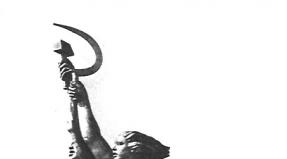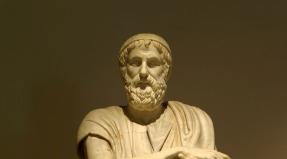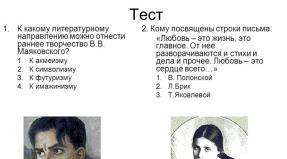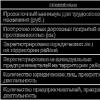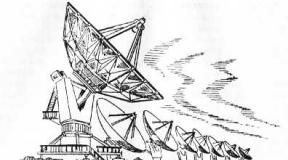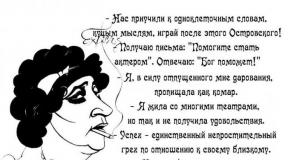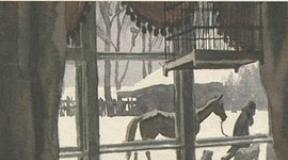Quintus Horatius Flaccus (lat.Quintus Horatius Flaccus). Horace - biography, information, personal life of Quintus Horace Flaccus
HORATUS Quintus Flaccus (Quintus Horatius Flaccus) (8.12.65 BC, Venusia, now Venosa - 27.11.8 BC, Rome), Roman poet. The son of a small landowner, a freedman; attended the grammar school Orbilia Pupilla in Rome, in 45-44 he studied Greek philosophy, literature and art in Athens. During the civil war, after the assassination of Julius Caesar, he was a confidant of Marcus Junius Brutus, commanded a legion of Republicans as a military tribune; was defeated and fled from the battlefield at Philippi (42); having received an amnesty, he returned to Rome, where he was forced to earn a living, serving as a scribe in the treasury. In his free time, he began to write poetry, became close to Virgil, who introduced him to Maecenas (38), whose patronage eliminated the need to work and allowed himself to devote himself to creativity. Having become one of the central figures of the circle of the Patron, Horace received as a gift the Sabine villa (not far from modern Tivoli), where he retired from the bustle of metropolitan life, preferring to live in the bosom of nature for public service. He was buried on Esquiline next to the Maecenas, to whom many works from the poetic heritage of Horace are fully preserved, which have been completely preserved to this day: two books "Satyr" (35 and 30; Horace himself called them "Conversations", "Sermones"), a collection of "Epods" ( "Chorus", "Epodes", 30; Horace called them "iambs"), four books "Ades" (book 1-3 created at 23; book 4 in 13; the ancient name - "Songs", "Carmina") , two books of the Epistles (Epistulae, 20 and 13), and the Jubilee Hymn (Carmen saeculare, 17), dedicated to the festivities in Rome.
Horace was initially close to neoterics, but he chose not the fashionable Alexandrian poets, but the iamba of Archilochus as a model for his episodes, borrowing not only the Greek poetic meter, but also an angry and accusatory tone, which often turns into frank abuse directed at his contemporaries. In some episodes (7th and 16th) he bitterly condemned the civil wars in which Rome was mired, opposing them with the traditional way of village life (2nd episode), as well as Epicurean joys and love pleasures (11th and 13th) d). In the satire of Horace, there are no polemical sharpness and topical themes. Taking as a basis the genre developed by Publius Terentius Varronus of Atacin and Lucilius, Horace developed it in the perspective of stoicism, increasingly abandoning caustic invectives in favor of an ironic interpretation of vices: satire written in hexameters are formally built on the principle of the diatribe; being a discourse on Roman morals, they become a glorification of the regime of Augustus. The pinnacle of Horace's poetic mastery is odes; Greek song lyrics (Alcaeus, Sappho, Anacreon, etc.) were chosen as their samples, the poetic dimensions of which Horace masterly adapted to the Latin language, having achieved a formal variety and elegance unprecedented in Roman poetry. The content of the odes is also rich: patriotic-patriarchal discourses about the world power of Rome (the so-called Roman odes; the image of Rome as a ship wandering on the violent sea, etc.) alternate with personal themes (idyllic descriptions of the Sabine villa, motives of love, country life, a friendly feast, etc.) etc.). Horace urged to do with little, not to pursue pleasures and to enjoy every moment of life; his principle is "seize the day" ("carpe diem"), and the ideal is a harmonious balance of public and private, life without suffering generated by immoderation and envy, the "golden mean" that he himself tried to observe in his work, refusing to express excessive passions and extremes, more and more inclined towards a detached tone, including in the complimentary descriptions of the emperor Augustus and the military exploits of his stepsons Tiberius and Drusus in the 4th book of Aude.
The theme of the status of a poet and poetry, universal for world literature, was initiated by the most famous poem of Horace - an ode to Melpomene, known as the "Monument" ("Exegi monumentum"; Russian translation and transcriptions by M.V. Lomonosov, 1747; G.R. Derzhavin, 1796 ; A. S. Pushkin, 1836; A. A. Feta, 1854; V. Ya. Bryusova, 1918, etc.), which proclaimed the idea of timeless poetic creativity, granting immortality to its creator. Reasoning about poetry became the main theme of the 2nd book of the Epistles; Particularly popular was the third letter of Horace, entitled "To the Pisones" ("Ad Pisones", another name for "Science of Poetry", "Ars poetica", the translation of A.A. Fet is known, published in 1883), in which Horace, continuing traditions of poetics of Aristotle, developed the concept of art as a craft, masterly processing of form, becoming the most prominent theorist of Roman classicism.
Horace's influence on world literature is enormous: even in antiquity, his legacy was studied in schools, the satirists Persius and Juvenal imitated him, Suetonius Tranquill compiled his biography, Porfiry wrote one of the first comments on his works. In the Middle Ages, Horace was highly regarded as a moralizer (about 250 manuscripts with the works of Horace dating from the 8-11th centuries have come down), Dante in his "Divine Comedy" placed "the satirist Horace" in Limbo next to Homer. The lyrics of the Renaissance are full of motives and direct references to the work of Horace (F. Petrarch, L. Ariosto, P. Ronsard, J. du Bellay, etc.); Horace was often quoted by M. Montaigne, Erasmus of Rotterdam; from the 16th century in European schools there was a practice of choral performance of his odes; moral attitudes were actively preached by the Jesuits. Horace's aesthetic principles were developed by the poets of the Pleiades (translation of the Science of Poetry into French by J. Peletier du Mans, 1545) and classicists of the 16-18 centuries: treatises by M. J. Vida, M. Opitz, B. Johnson, N. Boileau, A. Popa; discussions about the tragedy and comedy of P. Corneille, J. Racine and others. A number of well-known fables by J. de La Fontaine were inspired by stories from Horace, his influence on the development of satire in the 17-18 centuries is noticeable (N. Boileau, J. Dryden, D. Swift and others). Horatian motifs are found in Moliere, F. Fenelon, Voltaire, D. Diderot, A. Chenier, J. J. Rousseau, I. V. Goethe, V. Hugo, J. Byron, C. Leconte de Lille, J. M. de Heredia and others, among many Russian poets.
Cit .: Complete. collection op. M .; L., 1936; Collected composition SPb., 1993; Opera. Monachii; Lipsiae 2001; Virgil. Bucolics. Georgiki. Aeneid. - Horace. Odes. The episodes. Satyrs. Messages. The Science of Poetry. M., 2005.
Lit .: Bonfante G. La lingua parlata in Orazio. Venosa, 1994; Lyne R. O.A. M. Horace: behind the public poetry. New Haven; L., 1995; Borukhovich V.G. Quint Horace Flaccus: poetry and time. Saratov, 1996; Oliensis E. Horace and the rhetoric of authority. Camb. 1998; Gasparov M.L. Horace, or the Gold of the Middle // Gasparov M.L.On antique poetry. M., 2000; Moreva Vulikh N.V. Roman classicism. Creativity of Virgil, lyrics by Horace. SPb., 2000; Citti F. Studi oraziani: tematica e intertestualità. Bologna, 2000; Cucchiarelli A. La satira e il poeta: Orazio tra Epodi e Sermones. Pisa, 2001; Maurach G. Horaz: Werk und Leben. Hdlb. 2001; McNeill R. L. B. Horace: image, identity and audience. Balt. 2001; Patier H. Horace à la campagne. R., 2003; Hills P.D. Horace. L., 2005.
A. V. Golubkov, T. F. Teperik.
The content of the article
HORATION, QUINT HORATION FLACK(Quintus Horatius Flaccus) (65–8 BC), Roman poet, one of the most famous authors in all world literature. Born 65 BC in Venusia (modern Venosa) in the Apulia region in southern Italy. Horace's father, whom the poet himself speaks of with enthusiasm and admiration (he does not mention his mother), was a freedman. He made money for a small estate from the craft of the assistant auction manager. Wishing that a capable young man received an excellent education, his father brought Horace to Rome and entrusted him to the care of the famous grammar and mentor Orbilius Pupilla. The father himself took on the role of a "teacher", that is, a person accompanying the child to school (usually this responsibility was assigned to a slave). At the age of 20, Horace went to Athens to complete his education. In 44, Mark Junius Brutus, one of the conspirators who killed Caesar, also arrived in Athens, ostensibly to pursue philosophy, in fact, to recruit officers for his future army among the young Romans who studied in Greece. When Mark Antony and Octavian (the future Augustus) opened hostilities against the "liberators", Horace sided with Brutus. At 22, he received the rank of military tribune and accompanied Brutus to Asia Minor. But Horace was not an inflexible republican: having survived the fatal battle for Brutus at Philippi (42 BC), he returned to Rome with "clipped wings", especially since during this time he managed to lose both his father and the expected estate (it was confiscated in favor of demobilized veterans). A general amnesty followed, and Horace succeeded in obtaining the post of scribe in the treasury.
Poems written by Horace at this time attracted the attention of Virgil and Varius Rufus. They introduced the young man to the closest associate of Augustus Maecenas, and in 38 BC. the latter received Horace among his friends. The patron was not only a friend, but also a patron of poets. He received the eternal gratitude of Horace, introducing him into the literary and political circles of Rome, and in 33 BC. Horace received from Maecenas a small estate in the Sabine Mountains, thanks to which he no longer had to bother about his daily bread.
During this period, the poet was still concerned about politics. Naturally, he joined the party of his patron, although he never disowned his old Republican friends. Horace became an active adherent of Augustus only as a result of the military conflict that broke out between him and his former ally Mark Antony, which ended with the victory at Actium (31 BC) and the capture of Alexandria (30 BC). After these events, Horace made a significant contribution to the campaign carried out by Augustus for the political and moral revival of Rome.
Turning to poetry at a time of disappointment after the defeat at Philippi, Horace chose two witty and caustic authors as a model: from the Greek Archilochus (c. 675 - c. 635 BC) he borrowed iambic, from the Italian Lucilius (c. 180 –102 BC) - satire. First book Satyr Horace (he himself called them Sermones, i.e. Conversations), consisting of ten poems written with a hexameter, came out approx. 35 BC After the victory of Augustus, approx. 30 BC, Horace collected 8 more satyrs in the second book, adding 17 short iambic works called Epochs... After that, a decisive turn took place in the work of Horace. He found the dimensions corresponding to his now positive frame of mind in the Aeolian lyric (i.e. intended to be performed with accompaniment) poetry of the early 6th century. BC, from Alkeus and Sappho, they also drew inspiration from them. He also turned to the more lightweight lyrics of Anacreon, and to the more rational and learned Hellenistic poetry. Horace skillfully adapted these dimensions to the Latin language, with the ease of a real master he used the noble Alcaean verse, the graceful sapphic stanza, and the flowing asclepiades. In 23 BC. he released Odes, 88 poems of various metrics, size (from 8 to 80 lines) and intonation, carefully distributed over three books (lat. Carmina, i.e. Songs, Odami they were named after antiquity).
In the next six years, Horace stopped writing lyric (in the ancient sense of the word) poems. In 20 BC. the first book written with a hexameter was published Messages, which included 20 letters of predominantly philosophical content, more strict in form than Satyrs, but quite individual and sincere. During these years, for a number of reasons, Horace largely loses his former frivolity. He is acutely aware that youth with all its joys is leaving him. In 23 BC. The patron did not please Augustus and was pushed aside from the position of the person closest to him. In 19 BC. died beloved by Horace Virgil, as well as Tibullus. However, in 17 BC. Augustus commissions Horace to compose a hymn in honor of the great Hundred Years Games. This finally gave Horace widespread fame, and he returned to the lyrics. When creating 15 odes written in the next few years, collected in book IV, Horace was motivated by the feeling that poetry is capable of granting immortality to a person. Here we find admiration for the emperor, and sometimes flattery. The same is the inspirational, brilliant 1st poem from Book II. Messages, addressed to August at his direct request. It discusses the state of Roman poetry, with Horace defending contemporary writers against attacks from antiquity. The time of writing the famous Epistles to the Pisons(entitled in later tradition Ars poetica, i.e. The art of poetry) it is not established, as it is not known exactly when Horace refused the offer of Augustus to take the place of his personal secretary. In 8 BC. The patron died, and Horace survived him by only two months. He was buried on Esquiline next to Maecenas.
Style and technique.
Satyrs began with a close copy of Lucilius. Even the description of the actual trip of Horace from Rome to Brundisium (I 5) was prompted by a poem belonging to Lucilius about a trip to Sicily. Like that, Horace masterfully reproduces the disorder of a living speech flow, imperceptibly passes from one subject to another, intersperses here and there picturesque scenes and allusions, as well as snatches of dialogue. Horace gradually comes to realize that the value and significance of the satyrs of Lucilius is in their autobiography. Book II Satyr Horace naturally develops this form simultaneously in two directions: to the autobiography of his Messages and to the accusatory pathos, which we are used to associating primarily with Juvenal and with the genre of satire as such. II book Messages consists of two extensive literary treatises full of sound ideas, which have been given the appropriate form: one letter is addressed to Augustus, the other to Julius Florus. Relatively more extensive (476 lines) The arts of poetry the ancient commentator reports that this work is based on the treatise of Neoptolemus of Paros (3rd century BC)
Even from the few fragments of Archilochus that have come down to us, we can conclude that in our Epochs Horace borrows some idea from Archilochus, and then develops it in accordance with his usually more good-natured state of mind. Also in Odah he takes an idea from Alcaeus or another Greek poet, and then gives it a direction that in no way could have appeared in the original. If we talk about the formal side, these lyrical works are characterized by inventive thoughtfulness down to the smallest detail, metrical variety, carefulness in words, their euphony and surprisingly elegant arrangement. Here all the best that the Latin language gave the turns of the Cicero speeches is used. Almost all poems are addressed to someone. This clearly affects them: in terms of intonation, all these are more exhortatory or encouraging than purely personal works. Many are written for the occasion (or so they say). Very few odes were intended for singing. There are also majestic patriotic hymns (influenced by Pindar), especially the first six in Book III. Love does not evoke deep feelings in the poet, passion reveals itself only in Epochs... V Odah a poet who has reached adulthood turns into an indifferent spectator of a human comedy, ready to laugh at both a stranger and his own folly. Horace also has charming poems about village life.
Influence.
In the Middle Ages, Horace was revered as a moralist, the author of satyrs written in hexameter. Him, "the satirist Horace", Dante ( Hell IV) assigns a place in Limbe after Virgil and Homer. The renaissance was inaugurated by Horace. In 1347, Petrarch acquired a manuscript containing his works, and in some of his poems he shows a clear influence of Horace. The humanists considered Horace entirely their own, but the Jesuits also valued him highly, for an emasculated or Christianized Horace could have a positive moral effect on his disciples. The picture he drew of a simple country life was to the liking of people similar to his fate, who adhered to close tastes, such as Petrarch, Ronsard, Montaigne and Robert Herrick. The second episode, which was rather conventional in the expression of feelings, was especially highly valued. In England, Ben Johnson was the first popularizer of Horace, and some of Milton's sonnets were undoubtedly influenced by Horace. These poets, as well as E. Marvell and other writers of the 17th century. understood Horace better than most of his admirers in the 18th century, whose superficial enthusiasm rather damaged his reputation. At the same time, the lyrical dimensions of Horace were also used in Latin versification, the German humanist Konrad Celtis (1459–1508), who also established the custom of singing Horace's odes in school, which was done in the 16th century, was especially successful. common practice. Subsequently, Horace began to be translated into new languages, most successfully into German. Treatise The art of poetry had a tremendous impact on literary criticism. It was from him that, through the efforts of M.J. Wida, M. Opitz, N. Bouileau and A. Pop, were borrowed the classical principles, and the efforts to curb the excesses of the Baroque were based on references to him. However, "Tempest and Onslaught", other movements of the romantics were not on the path with the singer of prudence, poise and moderation, and since then Horace's popularity never rose to its former height.
Quintus Horace Flaccus (65 BC-8 BC) - poet of the ancient Roman era. The period of his creativity coincided with the civil war, the end of the republic and the birth of the new regime of Octavian Augustus. In the literature of ancient Rome, this was the "golden age".
Origin
Horace was born on December 8, 65 BC. e. His father in the past was a slave, then released, owned a modest estate in the Italian commune of Venusia (a military colony of Rome in the southeastern part of Italy, located at the junction of the regions of Apulia and Lucania). The poet's full name is known from his works. When the emperor Augustus instructed him to compose the "Jubilee Hymn", then in the signature to this work it was stated "The song was written by Quintus Horace Flaccus."
Since Horace's parent was a freedman, his son was legally equated to a free-born child. But all the same, such an origin in a social society was considered inferior, it could finally be smoothed out only after one generation. This fact influenced the creative direction and worldview of the future poet.
Horace never mentioned his mother anywhere and never in his works, so nothing is known about the woman who gave birth to him. There are only a few references to a certain nanny Pullia.
Education
The family lived quietly on a provincial estate and led a rather frugal life. But when the boy began to grow up, his father decided to leave everything and move to Rome. He wanted his son to go into a higher society, and for this it was necessary to get a decent education in the capital. Horace described his father as a poor and honest peasant. Nevertheless, he managed to find an occupation in the capital, with the help of which he covered the costs of a decent education for his son. In Rome, my father got a job as a commission agent at auctions. The buyer and the seller paid him one percent of the transaction each.
All the stages of education that the Roman nobility went through at that time, Horace successfully passed. He received his initial training at the Roman school of Orbilia, where he was taught the "Latin Odyssey" by the ancient Roman playwright and poet Livy Andronicus and the ancient Greek poet-storyteller Homer.
Then he continued his studies in Athens at the Platonic Academy, where he studied Greek philosophy and literature. This Academy gave university knowledge, was considered a higher school, Roman young aristocrats studied there. For example, the son of the ancient Roman philosopher, orator and politician Cicero studied with Horace. At the Academy of Athens, Horace studied the Greek language very well, then even wrote his poetry in it.
Civil war period
The study of philosophy and literature in Athens, Horace had to be interrupted, since in 44 BC. e. killed Caesar, which was the beginning of the civil war. Six months passed after the death of the ruler, and Brutus appeared in Athens. He began to attend philosophical classes, but in fact, during the lectures, he was recruiting supporters of the republican system into his team. Brutus urged to fight against Caesar's successors - Antony and Octavian.
Horace supported the Republicans, sided with Brutus and joined his army. In the Roman legion, he got the unexpected commanding position of a military tribune. In fact, he became an officer of the legion, and then such positions were mainly given to children of the privileged Roman estates (senators or equestrians). Such a position could well serve as the beginning of a military career, and in peacetime with it one could find work in the estate bodies of the city government.
Most likely, by this time, Horace's father possessed sufficient funds to enroll his son in the equestrian class. In ancient Rome, all this was determined as a result of a qualification - a kind of census of the property and condition of citizens with the aim of dividing society into military and socio-political estates.

In the fall of 42 BC. e. at Philippi, the battle of the republican troops under the leadership of Cassius and Brutus with the army of Octavian and Antony took place. The Republicans were defeated and fled. After that, Horace reconsidered his views, completely changed his position in relation to power and later said many times that these were his early republican adventures and illusions that almost cost him his life. Although this was the first sign of cowardice, Horace did not hide: he survived only because he threw down his shield and fled from the battlefield.
Return to Rome
At the beginning of 41 BC. e. Horace returned home to Venusia, by that time his father had already died. And the native province was included in the list of settlements that were given as a reward to the veterans of Caesar's army. All property and inheritance of Horace was confiscated.
In 40 BC. e. an amnesty was announced to the supporters of Brutus, and Horace left for Rome. Although he complained about the poverty and poverty that forced him to study poetry, Horace had the funds he paid to get a position on the college of the scribes of Quaestor. He worked as a secretary, thereby ensuring himself a residence in Rome and the opportunity to freely study literature.
After 1-2 years, he composed his first poetic works in Latin. These were poems in the antique classical hexameter size, which were later included in the first book "Satyr" and the iambic "Epochs". He met two poets, Lucius Varius Rufus and Publius Verilius Maron, and they, in turn, introduced the aspiring poet to Octavian's comrade-in-arms and good friend, Guy Cilius Maecenas. He patronized art and, under Octavian, held a position similar to that of the Minister of Culture.

Friendship with the patron
For nine months, Maecenas hesitated and, in the end, decided to bring Horace closer to him. Once in such an environment, the poet still remained balanced and circumspect, he never tried to stand out with something, did not flatter anyone, with due attention he followed all the socio-political reforms carried out by the ruler Octavian. Perhaps, in some ways, Horace did not agree with the policy of the ruler, but he was infinitely grateful to him only for the fact that after a hundred years of civil wars, the peace that everyone had been waiting for had finally returned to Italy.
Octavian made Horace an offer to become his personal secretary, but this position did not attract the poet, and he politely declined. Despite the fact that the position of secretary was very tempting and profitable, Horace did not want to lose his independence, which he greatly appreciated.
Horace traveled a lot with Maecenas. They visited Cape Palinur, where Octavian suffered a naval defeat, in the Italian sea port of Brindisi, at Cape Akcius, where the last great naval battle between the ancient Roman fleets took place in antiquity.
Repeatedly in his poems, Horace noted that their relationship with the Patron was based solely on friendship and respect for each other, regardless of social status. Their relationship was never "patron and subordinate." Horace never abused this friendship and did not demand anything from the Maecenas, he did not even try in this way to return his father's house, which was confiscated in Venusia.

Creation
Horace had a calm disposition, and he did not like city life with its worries and worries. The poet preferred to live in a quiet village. In 33 BC. e. he acquired an estate on the Tibur River in the Sabine Mountains. There is no exact data - whether he was able to buy the estate at his own expense or it was a gift from the Maecenas.
Here he wrote his famous works:
- the second book "Satyr";
- collection of 17 poems "Epods";
- the first collection of lyric poems "Songs";
- the first book of the Epistles (it included 20 verses);
- the second collection of "Messages".
In 17 BC. e. in Rome, the period of civil wars ended, an era of renewal and prosperity came. Celebrations of these events were planned for large-scale and complex, the scenario was developed very carefully. The announcements said that no one had ever seen such a ceremony and would never see it again, the most noble people of Rome were to take part in it.

In this regard, Octavian instructed Horace to compose a hymn for the ceremony, which was supposed to be the end of the festive events. For the poet, this was the highest praise, thus the state recognized that Horace was in the leading position in Roman literature. He wrote the "Jubilee Hymn", which was sung simultaneously by 27 girls and 27 young men in the Temple of Apollo Palatinsky. The poet gained recognition and popularity.
His satire was different from others. He never attacked the flaws of his contemporaries, did not try to change the behavior of people, and even more so to punish them for something, his works did not splash with rage. In all his satires, it is clear that he is an extremely benevolent person, he did not directly condemn anyone, but, on the contrary, offered to reflect on the nature and essence of people. He never touched on actual politics in his work, never switched to personal likes and dislikes. His ridicule and teachings were of a general nature, and everyone was left with the right to draw their own conclusions.
Horace died of a sudden illness on November 27, 8 BC. e. Maecenas had died 59 days earlier. Horace was 56 years old, he bequeathed his entire literary heritage to Octavian Augustus. The disease came and progressed so sharply and quickly that Horace could not even sign the last will and testament. He did it orally in front of witnesses.
He was buried near the grave of Maecenas. On the planet Mercury, a crater was named after Horace.
Quintus Horace Flaccus (65-8 BC) is an ancient Roman poet who lived and worked in the turbulent age of the conqueror Julius Caesar, who elevated Rome, and the emperor Augustus Octavian, the adopted son of Caesar and the first emperor of Rome.
Biography of Horace
The youth of Horace, the son of a freedman (former slave), coincided with Caesar's victory in the civil war. After the assassination of Caesar, Horace joined the leaders of the conspiracy - Brutus and Cassius, who were soon defeated in the war against Caesar's successor; then Horace was amnestied and returned to Rome. On this, his short active participation in political life was over, and he chose another field, which became the main one in his life - literary activity.
Already the first literary experiments of Horace attracted the attention of connoisseurs of poetry: famous poets brought him closer to themselves. Virgil introduces Horace to Maecenas, patron saint of people of art and close friend of Augustus Octavian. This acquaintance allowed Horace to gain the favor of the emperor, who eventually even invited him to take the place of his personal secretary. Horace refused the offer, following the principle of the golden mean chosen in life ( aurea mediocratus ), proclaimed by him in one of his odes. This expression became winged. Horace also did not abuse his closeness to the Maecenas, thanks to whose patronage he could only study literature all his life.
The fame and significance of Horace as a poet were so great that the emperor Augustus Octavian commissioned him to write the jubilee hymn for the inauguration of a century of games that were supposed to mark the end of wars and the beginning of the era of prosperity of Rome (17 BC). The singing of the anthem by a chorus of twenty-seven youths and twenty-seven girls on the snow-white steps of the Temple of Apollo, chanting the "seven-hill city" - Rome, became the central episode of the solemn ceremony. Augustus' commission meant the recognition of Horace as the first poet in Rome.
Quintus Horace Flaccus died suddenly, from a fleeting illness, in the prime of his poetic fame.
Creativity Horace
Horace turned out to be much luckier than his older contemporary Catullus: his poetic legacy has come down to us in full, which is largely due to the widespread recognition of his poetry and its support by the authorities. The works of Horace and their fragments were invariably included in the anthologies of Roman literature, the programs of schools and academies, so they easily passed from century to century. However, it was not only because of his high position that Horace the poet remained for centuries. This was facilitated by the high skill of his poetry, the grace of verse, the widest metric range, the richness of themes, the magnificent development of the traditions of the Greek lyric poetry of Archilochus, Alcaeus, Sappho in Latin poetry.
Horace's legacy consists of poems that instill in the Roman a wise attitude towards power and other people; satyr and conversations in which the poet teaches to find harmony between his personality and society and calls for a return to the good morals of his former life; messages containing teachings and a description of the science of creating poetry. Among the many works, the "Jubilee Hymn", created in the year of the highest rise of Rome (17 BC), stands out:
Let, O Sun, you, what you give and hide
Day, - born different and the same, - let
You will not see anything more glorious anywhere
City of Rome.
Translation by N.S. Gunzburg
A special place in the work of Horace is occupied by lyrical odes, poetic works written in a high style for the approval of Roman ideology and glorifying the values of life and dignity of people, the significance of their deeds. The most famous lyric work of Horace in Russia was the ode XXX ("Monument"), which served as a role model for the Russian poets M.V. Lomonosov, G.R. Derzhavin and A.S. Pushkin.
Ode to Horace XXX ("Monument") became the basis for the emergence of a new genre in world literature - the genre of lyric poem, in which the poet affirms the importance of poetry in the world and sums up his personal creativity. The main theses of Horace's ode are as follows: the poet created a monument to his work, which is stronger than metal and is not subject to either the passage of time or the destructive effects of the elements. In the phrase “no, not all of me will die” the poet asserts not his immortality as a person, but the immortality of poetry, which represents “the best part of him” in a person. His poetry will not disappear as long as the ancient rite of his country is preserved and spread to all its borders. Poetry flows from one time to another, like the “Aeolian melody into the Italic song”. Horace is proud of his contribution to the preservation of poetry and thanks Melpomene, the muse of tragedy, who is benevolent to him.
Horace called his ode "To Melpomene", she received the name "Monument" in translations and imitations. Obviously, referring to the muse of high poetry - tragedy, he wanted to emphasize the enormous role and merit of the poet, who turned his life into a poetic feat. That is why a tradition has arisen in literature to refer to this work. Translators and philological scholars tried to adhere to the text of Horace, for example, Lomonosov, being a scientist and poet, translated the ode close to the source. On the contrary, Derzhavin and Pushkin, outstanding Russian poets of the classical period, created their "Monuments", close in spirit to Horace's ode, enclosing content and ideas that were relevant for their time. However, the main thoughts of Horace about the eternity and greatness of poetry, its significance for his people, the heroic deed of the poet remain unchanged.
Epods (Chorus) is a collection of poems written in iambic meter. In these works, Horace is guided by the ancient Greek lyric poet Archilochus. The collection contains 17 episodes. They contain themes of the contemporary poet of Roman reality. Most of the episodes have the character of a personal invective, but with a focus on exposing certain moments of social reality.
In Epode IV Horace attacks some upstart freedman (name not named), who, thanks to his wealth, “sits like a prominent horseman in the first rows” (verse 35); with anger, the poet attacks the witchcraft widespread at that time, stigmatizing the old women engaged in this craft (the common name of the sorceress Canidia) - episodes III, V, XII. Epode V tells of the murder of a boy by sorceresses in order to prepare a "love potion" from his entrails. Horace threatens them:
“All of you filthy old women, with stones
Will beat the crowd in the street
And the corpses of the wolves will be torn apart by predatory
And the birds are Esquiline "
(Epode V, verses 97 - 100; translated by F. A. Petrovsky).
The motive of the condemnation of the civil wars, which shook Rome and shattered its former power (episodes VII and XVI), sounded with great force. Epode VII, addressed to the Roman people, begins with the words:
“Where, where are you taking, criminal,
Snatching swords in madness ?!
Are there really few fields and waves of the sea?
Flooded with Roman blood? .. "
(Epode VII, verses 1-4; translated by A. Semenov-Tyan-Shanskiy).
In Epode XVI, written in 40 BC. e. - ten years before the publication of the entire collection, Horace speaks of the disastrous consequences of civil wars, that Rome dooms itself to suicidal death:
“For two generations now they have been languishing in civil war,
And Rome is being destroyed by its own power ... "
(Epode XVI, verses 1–2; trans. A. Semenov-Tyan-Shanskiy)
The poet does not see a way out of this situation, he enthusiastically sings the wonderful life on the "blissful islands", urging his compatriots to flee to these islands, which have not yet been affected by the general ruin. But there is no answer to the question posed by the poet himself about the location of the fabulous happy islands in this (XVI) era. Thus, the "blissful islands" are just a pipe dream. And then battles of Promotions in Epode IX, addressed to To the patron Horace, having ridiculed Antony for his submission to Cleopatra, glorifies the princeps for the first time. This is the only episode where a poet expresses his positive point of view and expresses a positive attitude towards a politician. As for the first episode (by location in the collection), it should be singled out especially for the programmatic motives expressed by Horace regarding his life position, and his attitude towards Octavian Augustus and Maecenas. The poem is the last of the episodes in time of creation. The addressee of this work is the patron saint of the poet Maecenas, to whom Horace declares loyalty:
"And in this, and in any I am ready to march,
hoping for your love
And not at all in the hope that I will succeed
Harness the oxen into the plows as much as possible ... "
(Epode I, verses 23–26, trans. N. Gintsburg).
Epide X, directed to the literary enemy of Horace, the poet Mevius, is close to Archilochus in the nature of the attacks. The character of the episode is parodic, built in the spirit of parting words common in Hellenistic literature with the wish of a good journey. However, Horace wishes Mevia not good luck, but all sorts of troubles on the way, while the addressee is endowed with all sorts of offensive names:
“Then the lascivious goat with the sheep
May it be a sacrifice to the storms! "
(Epode X, verses 23-24; trans. N. Gintsburg).
The collection contains episodes with a lyrical theme - these are the episodes XI, XIII – XV. They contain ironic and parodic moments, but there are no harsh attacks and denunciations. Epode XI parodies a sentimental love elegy. In Epide XIII, addressing his friends, the poet calls, despite difficult circumstances, “to grab an hour that was sent by chance,” because wine and songs save one from grievous sorrow. In Epide XIV, justifying himself to the Maecenas in his “sluggish inaction,” Horace confirms that “he has long promised to finish the song clean,” but he refers to his infatuation with “the slave Phryne,” and in an ironic manner speaks of the power of love interests. In Epode XV, addressed to a woman named Neera, she reproaches her for treason and says that there will be retribution - Flaccus will find himself another, more worthy one, and then: "it will be my turn to laugh."
Horace - "Satyrs"
Another important part of Horace's works - "Satires" - is represented by two collections: the first contains 10 satyrs, the second - 8. In the satire, the poet turns to moral and philosophical themes. Criticizing certain human vices and shortcomings, Horace expresses his life principles. The main principle of "contentment with little", based on the philosophy of Epicurus, translates into the preaching of rural life in the bosom of nature, away from the excitement of the city bustle. The problem of personal happiness is connected with the philosophy of moderation, an example of which Horace takes his own life; he is content with a quiet life on the estate presented to him by the Maecenas, where he is served by only a few slaves, and the fruits of the land of his estate.

Horace reads his satires to Maecenas. Painting by F. Bronnikov, 1863
This "philosophy of moderation" was a peculiar form of acceptance of the Augustus regime by wide circles of the nobility and by the poet himself, allowing them to maintain the illusion of independence and freedom. At the same time, Horace does not create a positive ideal in satire, although he clearly shows how not to live. Censuring the vices and shortcomings of individuals, Horace avoids too harsh criticism in his works. His satire has the character of preaching virtue and wisdom, it is devoid of harshness and accusatory power. In a number of satyrs (book. I, satire 4, 10; book. II, satire 1, 3) questions of literary theory are raised. The polemical part of these works is largely associated with the name of Horace's predecessor in this genre - the poet Lucilius:
“Yes, I, of course, said that Lucilius’s poems are rude,
That they run out of order. Who, senseless, will be
Is it to defend him in this? However on the same page
I praised him for the caustic salt of his jokes.
This merit belongs to him, but I cannot admit others "
(Book I, satire 1, verse 10; translated by M. Dmitriev).
Indeed, in the satyrs of Horace there is no "pungent salt" of Lucilius, who dared to sharp political denunciations. Horace accuses Lucilius of the fact that his satyrs flow "in a muddy stream," meaning haste in poetic work, which led to insufficient finishing of the verse. Horace himself strives for consistency in the presentation of thoughts and grace in the decoration of his works. But Horace recognizes the merits of Lucilius and calls him the "inventor" of the satire genre.
Horace - "Odes"
The greatest fame was brought to Horace by his "Odes" ("Songs") - a collection of lyric poems, consisting of four books. In these works, Horace focuses on the famous Greek poets: Alkea, Sappho, Anacreon. Perceiving their best traditions, adapting their poetic dimensions, using the achievements of previous Roman poetry, Horace reaches the pinnacle of perfection in Roman lyricism.
The themes of the Horace Odes are varied: these are friendly messages, and philosophical reflections, and hymns to the gods, love and civic lyrics. The first book opens with a poem, where Horace speaks of his poetic vocation, which received the support of the powerful patron of the Patron of the Arts. The first lines of the ode are addressed to him:
"Glorious grandson, Patron of the royal forefathers,
Oh my joy, honor and refuge! "
(Book I, ode 1, verses 1–2; translated by A. Semenov-Tyan-Shanskiy).
Horace lists the hobbies of people that they prefer in their lives: sports, political arena, agriculture, trade, idle pastime, war, hunting. For each his own occupation is "the highest happiness." And then in two stanzas (the poem was written by the first Asclepian stanza), in an exquisite poetic form, he speaks of his vocation: "A cool grove nears me near the highest, where nymphs and satyrs lead a round dance." Horace expresses his hope for the mercy of Maecenas:
“If you join me with peaceful singers
I will lift my proud head to the stars "
(Book I, Ode I, verses 35–36; translated by A. Semenov-Tyan-Shanskiy).
The second ode to the first book is addressed to Augustus, whom Horace depicts as the god Mercury, "the winged son of the blessed Maya", who received the name of Caesar on earth. So, already the initial works of the collection give an idea of the ideological orientation of Horace's lyrics. And further, delving into the reading of Horace's works, the reader can see that the political motives that permeate the collection are associated with the glorification of Augustus and his politics.

Emperor Octavian Augustus ("Augustus from Prima Port"). Statue of the 1st c. according to R. Kh.
In the spirit of official ideology, Horace glorifies ancient Roman valor in the so-called cycle of Roman odes (Book III, odes 1–6), which constitute a certain thematic unity and are written in the same poetic size - the Alkey stanza. These odes are united by a common theme - they reflect the positive ideal put forward by the August program; in the center of the poet's attention is the state and its interests, the poet speaks of the pernicious influence of luxury and wealth, paints a picture of the degradation of Roman society, destroyed by venality: "a fighter whose freedom is bought by gold, will he become bolder?" (Book III, ode 5, verses 25-26). Horace sees a way out of this disastrous situation in the restoration of the old order, in the return to the beliefs of the gods, in the restoration of destroyed temples:
"The guilt of the fathers by the innocent defendant
You will, Rome, until you are restored
The fallen dwellings of the gods,
Their statues in black smoke "
(Book III, ode 6, verses 1-4; translated by N. Shaternikov).
In his works, Horace turns his gaze to the patriarchal gods, which corresponded to the official policy of Augustus, calls for the ancient Roman good manners, for the simplicity of life and for former valor (Book III, ode 2). He sees the embodiment of valor in Augustus, who rises above all people. In ode 3 of Book III, Horace prepares the apotheosis of Augustus: "from now on I will admit him (meaning Augustus) to the hosts of blessed gods" (verses 35-36). The reign of Augustus on earth is compared with the reign of Jupiter in heaven (Book III, ode 5). In the "Roman odes" the principle of unity of composition, taken from Hellenistic poetry, is maintained: the first and last poems of the cycle (odes 1 and 6) contain the same number of verses (48 each), both are addressed to the people, albeit with a slight difference: ode 1 is addressed to youth, to a new generation; in ode 6 there is no age limit.
The philosophical motives of "Horatian wisdom", which run through the entire collection of lyric poems, are associated with the praise of the enjoyment of the joys of life: love, feasts, the blessings and beauties of nature. In the spirit of the superficially perceived epicurean philosophy, the poet put forward the principles of “seize the day” (Book I, ode 11) and “use the present without thinking about the future” (Book I, ode 25), that is, enjoy the joys of today. This call is combined in the works of Horace with the preaching of "contentment with little" and the life principle of keeping to the "golden mean", which was formalized in an ode to Licinius (Book II, ode 10):
“Having chosen the golden mean measure.
The wise will escape the dilapidated roof,
Escape the palaces that people give birth to
Black envy.
The wind bends stronger than the age-old pines,
It is harder to fall for the tallest towers.
Lightning strikes more often
Mountain heights "
(Book II, ode 10, verses 5–12; trans. 3. Morozkina).
Even in such a traditional topic for the ancient poetic tradition as feasts and wine, Horace maintains his point of view with regard to moderation. In the banquet verses that are often found in his lyrics, he does not give free rein to Bacchus freedom and does not lose power over his own actions:
“But for everyone there is a measure in drinking: Lieber observes the limit.
The battle of the centaurs arose after wine with the Lapith clan - here
Drunk is the best lesson "
(Book I, ode 18, verses 7-9; translated by N. Ginzburg).
In ode 3 of Book II, Horace, in accordance with the philosophical views of the moderate Stoics, writes:
“Try to keep the spirit calm
In the days of adversity; on happy days
Do not get drunk with glee
Subject to death, as we all are, Dellius "
(Book II, ode 3, verses 1–4; translation by A. Semenov-Tyan-Shanskiy).
Odes dedicated to friends occupy a significant place. Of particular interest is the poem "To Pompey Var" (Book II, ode 7), translated by Alexander Pushkin, in which Horace recalls his escape from the battlefield when he "threw the shield at Philippi." This was in 42 BC. e. after the defeat of the Republicans led by Brutus, under whom the poet served. The theme of "loss of the shield" was encountered in the poems of the Greek poets Archilochus, Alcaeus, Anacreon. In the works of Horace, this topic is presented in its own way - the author uses literary reminiscences from Greek lyrics.
There is no passion in Horace's love odes. Horace is never at the mercy of love. He observes other people's passions (book. I, ode 5) or calls to the joys of love (book. II, ode 12). The heroines of his lyric works are numerous: Chloe, Pyrrha, Lalaga, Nebulus, etc. Among all the poems on this topic, only one ode (book III, ode 9), addressed to Lydia, stands out for its lyrical tonality. This poem is a dialogue between Horace and Lydia, where in an elegant form and playful tone the poet speaks of past mutual love, the happiness of new love when the objects of passion change, and the possibility of renewing relationships with each other. The poem ends with the words: "I want to live with you and die loving." But in this poem on a love theme, as in others, Horace does not create the image of a beloved. The heroines of the poet are not very specific, each time they are endowed with some quality peculiar only to her: Chloe is shy and unapproachable (book I, ode 23), Pyrrha is golden-haired (book I, ode 5), Gliker “shines brighter than marble Paros "(book I, ode 19), Myrtala" was more turbulent than the sea "(book I, ode 33). Horace is alien to the suffering of the betrayal of his beloved: if one rejects, then one can find consolation on the other. Therefore, he himself, with a playful reproach, turns to Barina, who "drives the young men of the crowd crazy":
“You know how to lie, remembering in vows
And father's ashes, and the night sky,
And the silence of the stars, and the gods who did not know
Death is cold.
But these vows only make Venus laugh,
And the nymphs laugh, and he himself is cruel
Cupid, sharpening on a bloody bar
Burning arrows "
(Book II, ode 8, verses 9-16; translated by F. A. Petrovsky).
The love works of Horace, to a greater extent than others, were influenced by Hellenistic, Alexandrian poetry. The most characteristic in this respect in book 1 is ode 30, addressed to Venus.
The final verses of books II and III Horace devotes to his poetic vocation and the theme of the poet's immortality in his works. He begins ode 20 of Book II with the words: "I will ascend on powerful wings, unseen, two-faced singer, ethereal heights" (verses 1–2).
Ode 30 to Book III, called "Monument", has gained the highest fame and enjoys worldwide fame. Here are the final lines of this piece:
"... Honored glory,
Melpomene, be proud, and, benevolent,
Now Delphi laurels crown my chapter "
(Book III, ode 30, verses 14-16; translated by S. V. Shervinsky).
Thus ends the third book of Horace's lyric poetry.
According to the original idea of the poet, the collection should have consisted of three books, and "Monument" was thought of as an ode that completes this work. But at the insistence of Octavian Augustus, 10 years after the publication of a collection of three books, a fourth book was written, containing 15 poems. The poet continues to glorify Augustus and his political activities, and also praises the stepsons of the princeps - Tiberius and Druse; pays much attention to the theme of the poet's immortality.
Horace also belongs to the jubilee hymn ("Song of the Century"), written for the nationwide celebration, which was supposed to herald the onset of the "golden age" provided by Augustus. The hymn was written for choral performance. His words are addressed to the gods Apollo and Diana with a prayer for the promotion of the prosperity of Rome and the divine Augustus.
Horace - "Messages"
The last works of Horace are "Messages". These are letters in poetic form with specific addressees. They are written in hexameters. The themes of the messages are varied due to the involvement of extensive illustrative material from life and literature. As for the main semantic orientation, in the first collection of "Messages" Horace seeks to reveal the "art of living" already achieved by him (to keep the "golden mean", not to be surprised at anything, to be able to be content with the available joys of life), and the second collection (of three "Messages" ») Is devoted to the issues of literary theory. Special mention should be made of the last "Epistle" - "Epistle to the Pisons" ("The Science of Poetry"). This message was already singled out by the ancients as a separate work, considering it as a statement of the theory of poetic art. Horace formulates the most important aesthetic principles of classicism about the unity, simplicity and integrity of the work. He talks about the content of art, about the means of influencing the audience, about the social significance of poetry and about the role of the poet. Much attention is paid to the artistic form and composition of the work, the criteria for evaluating poetic skill. The poet himself says this about the tasks that he sets himself in this, in his opinion, theoretical guide:
“Without doing it myself, I will show what is the gift, what is the duty of the poet,
What gives him the means, forms him and nourishes him,
What is good, what is not, where is the right path, where is the wrong "
(Epistles, Book II, Epistle 3, verses 306-308; translated by N. Ginzburg).
The Science of Poetry by Horace is a monument of ancient classical aesthetics. This work served as the basis for N. Boileau's "Poetic Art".
